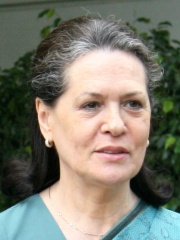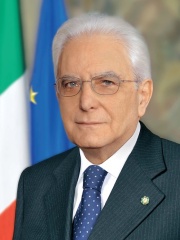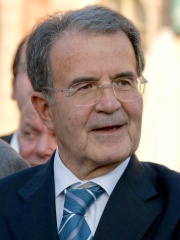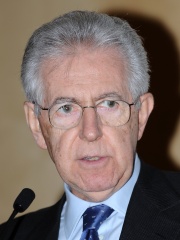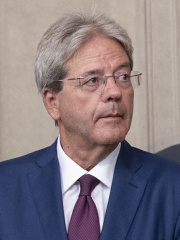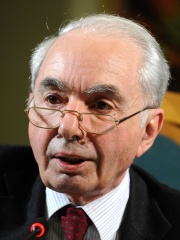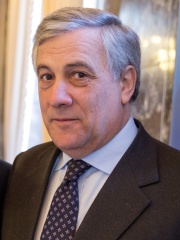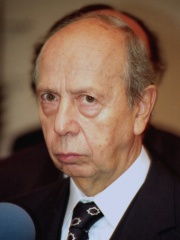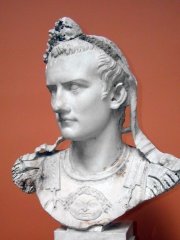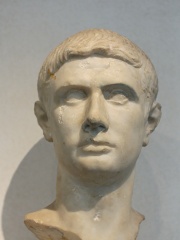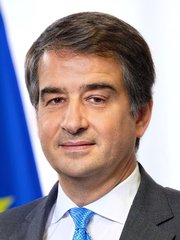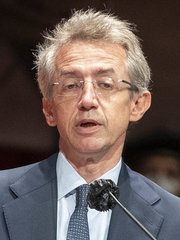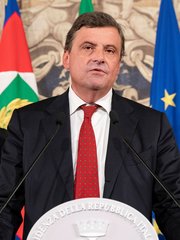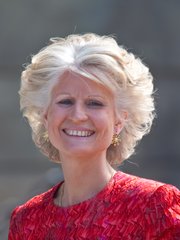

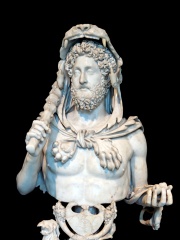
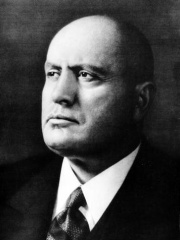


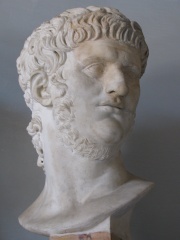
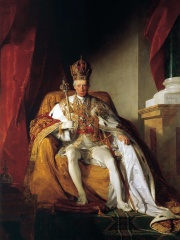
The Most Famous
POLITICIANS from Italy
This page contains a list of the greatest Italian Politicians. The pantheon dataset contains 19,576 Politicians, 956 of which were born in Italy. This makes Italy the birth place of the 4th most number of Politicians behind Germany, and France.
Top 10
The following people are considered by Pantheon to be the top 10 most legendary Italian Politicians of all time. This list of famous Italian Politicians is sorted by HPI (Historical Popularity Index), a metric that aggregates information on a biography's online popularity. Visit the rankings page to view the entire list of Italian Politicians.

1. Julius Caesar (100 BC - 44 BC)
With an HPI of 93.78, Julius Caesar is the most famous Italian Politician. His biography has been translated into 215 different languages on wikipedia.
Gaius Julius Caesar (12 or 13 July 100 BC – 15 March 44 BC) was a Roman general and statesman. A member of the First Triumvirate, Caesar led the Roman armies in the Gallic Wars before defeating his political rival Pompey in a civil war. He subsequently became dictator from 49 BC until his assassination in 44 BC. Caesar played a critical role in the events that led to the demise of the Roman Republic and the rise of the Roman Empire. In 60 BC, Caesar, Crassus, and Pompey formed the First Triumvirate, an informal political alliance that dominated Roman politics for several years. Their attempts to amass political power were opposed by many in the Senate, among them Cato the Younger with the private support of Cicero. Caesar rose to become one of the most powerful politicians in the Roman Republic through a string of military victories in the Gallic Wars, completed by 51 BC, which greatly extended Roman territory. During this time, he both invaded Britain and built a bridge across the river Rhine. These achievements and the support of his veteran army threatened to eclipse the standing of Pompey. The alliance between Caesar and Pompey slowly broke down and, by 50 BC, Pompey had realigned himself with the Senate. With his command expiring and the Gallic Wars largely concluded, the Senate ordered Caesar to step down from his military command and return to Rome. In early January 49 BC, Caesar openly defied the Senate by crossing the Rubicon and marching towards Rome at the head of an army. This began Caesar's civil war, which he won, leaving him in a position of near-unchallenged power and influence in 45 BC. After assuming control of government and pardoning many of his enemies, Caesar set upon a vigorous reform and building programme. He created the Julian calendar to replace the republican lunisolar calendar, reduced the size of the grain dole, settled his veterans in new overseas colonies, greatly increased the size of the Senate, and extended citizenship to communities in Spain and what is now northern Italy. In early 44 BC, he was proclaimed "dictator for life" (dictator perpetuo). Fearful of his power, domination of the state, and the possibility that he might make himself king, a group of senators led by Brutus and Cassius assassinated Caesar on the Ides of March (15 March) 44 BC. A new series of civil wars broke out and the constitutional government of the Republic was never fully restored. Caesar's great-nephew and adoptive heir Octavian, later known as Augustus, rose to sole power after defeating his opponents thirteen years later. Octavian then set about solidifying his power, transforming the Republic into the Roman Empire as its emperor. Caesar was an accomplished author and historian; much of his life is known from his own accounts of his military campaigns. Other contemporary sources include the letters and speeches of Cicero and the historical writings of Sallust. Later biographies of Caesar by Suetonius and Plutarch are also important sources. Caesar is considered by many historians to be one of the greatest military commanders in history. His cognomen was subsequently adopted as a synonym for "emperor"; the title "Caesar" was used throughout the Roman Empire, and gave rise to modern descendants such as Kaiser and Tsar. He has frequently appeared in literary and artistic works.

2. Augustus (63 BC - 14)
With an HPI of 92.03, Augustus is the 2nd most famous Italian Politician. His biography has been translated into 206 different languages.
Augustus (born Gaius Octavius; 23 September 63 BC – 19 August AD 14), also known as Octavian (Latin: Octavianus), was the founder of the Roman Empire, who reigned as the first Roman emperor from 27 BC until his death in AD 14. The reign of Augustus initiated an imperial cult and an era of imperial peace (the Pax Romana or Pax Augusta) in which the Roman world was largely free of armed conflict. The principate, a style of government where the emperor showed nominal deference to the Senate, was established during his reign and lasted until the Crisis of the Third Century. Octavian was born into an equestrian branch of the plebeian gens Octavia. Following the assassination of dictator Julius Caesar in 44 BC, Octavian was named in Caesar's will as his primary heir. Inheriting Caesar's estate and assuming his name, Octavian fought for the loyalty of Caesar's legions. He was made a senator during a state emergency and seized power by marching on Rome in 43 BC, becoming its youngest elected consul. He, Mark Antony, and Marcus Lepidus formed a triumvirate regime with legally sanctioned powers to outlaw and oppose the assassins of Caesar and their allies. Following their victory at the Battle of Philippi in 42 BC, the triumvirate divided the Roman Republic among themselves and ruled as de facto autocrats. The triumvirate was eventually torn apart by the competing ambitions of its members; Lepidus was exiled in 36 BC for opposing Octavian in Sicily, while Antony was defeated in Greece by Octavian's naval commander Marcus Agrippa at the Battle of Actium in 31 BC. Antony and his wife Cleopatra, the Ptolemaic queen of Egypt, killed themselves during Octavian's invasion of Egypt, which then became Octavian's personal property. After the demise of the triumvirate, Augustus reached an accord with the remaining Roman elite: he would restore the facade of a free republic, centered around the Senate, the executive magistrates and the legislative assemblies. But his control of the military and half of Rome's provinces meant he maintained autocratic power legitimized by his appointment as commander-in-chief of most Roman armies. To avoid the appearance of monarchy or dictatorship, he eventually refused to stand for reelection to the consulship, but was granted the powers of the tribunate and censorship by the Senate. A similar ambiguity is seen in his chosen names, the implied rejection of monarchical titles whereby he called himself princeps ('first citizen'), juxtaposed with his acceptance of the name Augustus ('the revered'). The Senate also granted him the title of pater patriae (lit. 'father of the country'), and named the month of August after him. After the death of Lepidus, Augustus also assumed the title of pontifex maximus ('supreme pontiff'). Augustus dramatically enlarged the empire, annexing Egypt, Dalmatia, Pannonia, Noricum, and Raetia, expanding possessions in Africa, and completing the conquest of Hispania. His expansionism, however, suffered a major setback in Germania. Beyond the frontiers, he secured the empire with a buffer region of client states and negotiated peace treaties with the Parthian Empire and Kingdom of Kush. He reformed the Roman system of taxation and currency, developed networks of roads with an official courier system, established a standing professional army, established the Praetorian Guard as well as official police and fire-fighting services for Rome, and renovated much of the city during his reign. Augustus was a writer and patron of poets such as Virgil, and has been featured in various works of art from ancient to modern times. Augustus died in AD 14 at age 75 from natural causes, and was posthumously deified by decree of the Senate. Persistent rumors, substantiated somewhat by deaths in the imperial family, have claimed his wife Livia poisoned him. He was succeeded as emperor by his adoptive son Tiberius, Livia's son and former husband of Augustus's only biological child, Julia.

3. Commodus (161 - 192)
With an HPI of 89.79, Commodus is the 3rd most famous Italian Politician. His biography has been translated into 79 different languages.
Commodus (; Latin: [ˈkɔmmɔdʊs]; 31 August 161 – 31 December 192) was Roman emperor from 177 to 192, first serving as nominal co-emperor under his father Marcus Aurelius and then ruling alone from 180. Commodus's sole reign is commonly thought to mark the end of the Pax Romana, a golden age of peace and prosperity in the history of the Roman Empire. Commodus accompanied his father during the Marcomannic Wars in 172 and on a tour of the Eastern provinces in 176. The following year, he became the youngest emperor and consul up to that point, at the age of 16. His solo reign saw less military conflict than that of Marcus Aurelius, but internal intrigues and conspiracies abounded, goading Commodus to an increasingly dictatorial style of leadership. This culminated in his creating a deific personality cult, including his performances as a gladiator in the Colosseum. Throughout his reign, Commodus entrusted the management of affairs to his palace chamberlain and praetorian prefects, namely Saoterus, Perennis, and Cleander. Commodus was assassinated by the wrestler Narcissus in 192, ending the Nerva–Antonine dynasty. He was succeeded by Pertinax, the first claimant in the tumultuous Year of the Five Emperors.

4. Benito Mussolini (1883 - 1945)
With an HPI of 88.36, Benito Mussolini is the 4th most famous Italian Politician. His biography has been translated into 153 different languages.
Benito Amilcare Andrea Mussolini (29 July 1883 – 28 April 1945) was an Italian politician and journalist who was the dictator of Italy during the Fascist period, which lasted from the March on Rome in 1922 until his overthrow in 1943. He founded the National Fascist Party (PNF) and served as Prime Minister of Italy from 1922, later adopting the title Duce ("leader") of Italian fascism. Mussolini first organized the Fasci Italiani di Combattimento (lit. 'Italian Fasces of Combat') in 1919, which evolved into the PNF that established a totalitarian regime. As the founder of fascism, Mussolini was a key inspiration and contributor to the rise of similar movements across Europe during the interwar period. Mussolini was originally a socialist journalist at the Avanti! newspaper. In 1912, he became a member of the National Directorate of the Italian Socialist Party (PSI), but was expelled for advocating military intervention in the First World War. In 1914, Mussolini founded a newspaper, Il Popolo d'Italia, and served in the Royal Italian Army until he was wounded and discharged in 1917. He eventually denounced the PSI, his views pivoting to focus on Italian nationalism, and founded the fascist movement which opposed egalitarianism and class conflict, instead advocating "revolutionary nationalism" transcending class lines. In October 1922, following the March on Rome, he was appointed prime minister by King Victor Emmanuel III. After removing opposition through his secret police and outlawing labour strikes, Mussolini and his followers consolidated power through laws that transformed the nation into a one-party dictatorship. Within five years, he established dictatorial authority by legal and illegal means and aspired to create a totalitarian state. In 1929, he signed the Lateran Treaty to establish Vatican City. Mussolini's foreign policy was based on the fascist doctrine of spazio vitale (lit. 'living space'), which aimed to expand Italian possessions and have an Italian sphere of influence in southeastern Europe. In the 1920s, he ordered the Pacification of Libya, the bombing of Corfu over an incident with Greece, and his government annexed Fiume after a treaty with Yugoslavia. In 1936, Ethiopia was conquered following the Second Italo-Ethiopian War and merged into Italian East Africa (AOI) with Eritrea and Somalia. In 1939, Italian forces annexed Albania. Between 1936 and 1939, Mussolini ordered an intervention in Spain in favour of Francisco Franco, during the Spanish Civil War. Mussolini took part in the Treaty of Lausanne, Four-Power Pact and Stresa Front. However, he alienated the democratic powers as tensions grew in the League of Nations, which he left in 1937. Now hostile to France and Britain, Italy formed the Axis powers with Nazi Germany and the Empire of Japan. The wars of the 1930s cost Italy enormous resources, leaving it unprepared for the Second World War; Mussolini initially declared Italy's non-belligerence. However, in June 1940, believing Allied defeat imminent, he joined the war on Germany's side, to share the spoils. After the tide turned, and the Allied invasion of Sicily, King Victor Emmanuel III dismissed Mussolini as head of government and placed him in custody in July 1943. After the king agreed to an armistice with the Allies in September 1943, Mussolini was rescued by Germany in the Gran Sasso raid. Adolf Hitler made Mussolini the figurehead of a puppet state in German-occupied north Italy, the Italian Social Republic, which served as a collaborationist regime of the Germans. With Allied victory imminent, Mussolini and mistress Clara Petacci attempted to flee to Switzerland, but were captured by communist partisans and executed on 28 April 1945.
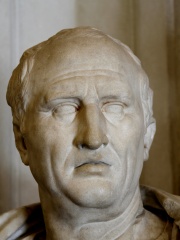
5. Cicero (106 BC - 43 BC)
With an HPI of 88.19, Cicero is the 5th most famous Italian Politician. His biography has been translated into 131 different languages.
Marcus Tullius Cicero ( SISS-ə-roh; Latin: [ˈmaːrkʊs ˈtʊlli.ʊs ˈkɪkɛroː]; 3 January 106 BC – 7 December 43 BC) was a Roman statesman, lawyer, scholar, philosopher, orator, writer and Academic skeptic, who tried to uphold optimate principles during the political crises that led to the establishment of the Roman Empire. His extensive writings include treatises on rhetoric, philosophy and politics. He is considered one of Rome's greatest orators and prose stylists and the innovator of what became known as "Ciceronian rhetoric". Cicero was educated in Rome and in Greece. He came from a wealthy municipal family of the Roman equestrian order, and served as consul in 63 BC. He greatly influenced both ancient and modern reception of the Latin language. A substantial part of his work has survived, and he was admired by both ancient and modern authors alike. Cicero adapted the arguments of the chief schools of Hellenistic philosophy in Latin and coined a large portion of Latin philosophical vocabulary via lexical innovation (e.g. neologisms such as evidentia, generator, humanitas, infinitio, qualitas, quantitas), almost 150 of which were the result of translating Greek philosophical terms. Though he was an accomplished orator and successful lawyer, Cicero believed his political career was his most important achievement. During his consulship in 63 BC, he suppressed the Catilinarian conspiracy. However, because he had summarily and controversially executed five of the conspirators without trial, he was exiled in 58 but recalled the next year. Spending much of the 50s unhappy with the state of Roman politics, he took a governorship in Cilicia in 51 and returned to Italy on the eve of Caesar's civil war. Supporting Pompey during the war, Cicero was pardoned after Caesar's victory. After Caesar's assassination in 44 BC, he led the Senate against Mark Antony, attacking him in a series of speeches. He elevated Caesar's heir Octavian to rally support against Antony in the ensuing violent conflict. But after Octavian and Antony reconciled to form the triumvirate (with Lepidus), Cicero was proscribed and executed in late 43 BC while attempting to escape Italy for safety. His severed hands and head (taken by order of Antony and displayed representing the repercussions of his anti-Antonian actions as a writer and as an orator, respectively) were then displayed on the rostra. Petrarch's rediscovery of Cicero's letters is often credited for initiating the 14th-century Renaissance in public affairs, humanism, and classical Roman culture. According to Polish historian Tadeusz Zieliński, "the Renaissance was above all things a revival of Cicero, and only after him and through him of the rest of Classical antiquity." The peak of Cicero's authority and prestige came during the 18th-century Enlightenment, and his impact on leading Enlightenment thinkers and political theorists such as John Locke, David Hume, Montesquieu, and Edmund Burke was substantial. His works rank among the most influential in global culture, and today still constitute one of the most important bodies of primary material for the writing and revision of Roman history, especially the last days of the Roman Republic.

6. Pompey (106 BC - 48 BC)
With an HPI of 87.68, Pompey is the 6th most famous Italian Politician. His biography has been translated into 87 different languages.
Gnaeus Pompeius Magnus (Latin: [ˈŋnae̯.ʊs pɔmˈpɛjjʊs ˈmaŋnʊs]; 29 September 106 BC – 28 September 48 BC), known in English as Pompey ( POM-pee) or Pompey the Great, was a Roman general and statesman who was prominent in the last decades of the Roman Republic. As a young man, he was a partisan and protégé of the dictator Sulla, after whose death he achieved much military and political success himself. A member of the senatorial nobility, Pompey entered into a military career while still young. He rose to prominence serving Sulla as a commander in the civil war of 83–81 BC. Pompey's success as a general while young enabled him to advance directly to his first consulship without following the traditional cursus honorum (the required steps to advance in a political career). He was elected as consul on three occasions (70, 55, 52 BC). He celebrated three triumphs, served as a commander in the Sertorian War, the Third Servile War, the Third Mithridatic War, and in various other military campaigns. Pompey's early success led dictator Sulla to give him the cognomen Magnus – "the Great" – after his boyhood hero Alexander the Great. His adversaries gave him the nickname adulescentulus carnifex ("teenage butcher") for his ruthlessness. In 60 BC, Pompey joined Crassus and Caesar in the informal political alliance known as the First Triumvirate, cemented by Pompey's marriage with Caesar's daughter, Julia. After the deaths of Julia and Crassus (in 54 and 53 BC), Pompey switched to the political faction known as the optimates—a conservative faction of the Roman Senate. Pompey and Caesar then began contending for leadership of the Roman state in its entirety, eventually leading to Caesar's civil war. Pompey was defeated at the Battle of Pharsalus in 48 BC, and he sought refuge in Ptolemaic Egypt, where he was assassinated by the courtiers of Ptolemy XIII.

7. Marcus Aurelius (121 - 180)
With an HPI of 87.41, Marcus Aurelius is the 7th most famous Italian Politician. His biography has been translated into 112 different languages.
Marcus Aurelius Antoninus ( or-EE-lee-əs, Latin: [ˈmaːrkʊs au̯ˈreːli.us antoːˈniːnʊs]; 26 April 121 – 17 March 180) was Roman emperor from 161 to 180 and a Stoic philosopher. He was a member of the Nerva–Antonine dynasty, the last of the rulers later known as the Five Good Emperors and the last emperor of the Pax Romana, an age of relative peace, calm, and stability for the Roman Empire lasting from 27 BC to 180 AD. He served as Roman consul in 140, 145, and 161. Marcus Aurelius was the son of the praetor Marcus Annius Verus and his wife, Domitia Calvilla. He was related through marriage to the emperors Trajan and Hadrian. Marcus was three when his father died, and was raised by his mother and paternal grandfather. After Hadrian's adoptive son, Aelius Caesar, died in 138, Hadrian adopted Marcus's uncle Antoninus Pius as his new heir. In turn, Antoninus adopted Marcus and Lucius, the son of Aelius. Hadrian died that year, and Antoninus became emperor. Now heir to the throne, Marcus studied Greek and Latin under tutors such as Herodes Atticus and Marcus Cornelius Fronto. He married Antoninus's daughter Faustina in 145. After Antoninus died in 161, Marcus acceded to the throne alongside his adoptive brother, who took the regnal name Lucius Aurelius Verus. Under the reign of Marcus Aurelius, the Roman Empire witnessed much military conflict. In the East, the Romans fought the Parthian War of Lucius Verus with a revitalised Parthian Empire and the rebel Kingdom of Armenia. Marcus defeated the Marcomanni, Quadi, and Sarmatian Iazyges in the Marcomannic Wars. These and other Germanic peoples began to represent a troubling reality for the Empire. He reduced the silver purity of the Roman currency, the denarius. The persecution of Christians in the Roman Empire appears to have increased during his reign, although his involvement is unlikely since there are no Christian sources ascribing him the blame, and he was praised by Justin Martyr and Tertullian. The Antonine Plague broke out in 165 or 166 and devastated the population of the Roman Empire, causing the deaths of five to ten million people. Lucius Verus may have died from the plague in 169. When Marcus himself died in 180, he was succeeded by his son Commodus. Commodus's succession after Marcus has been a subject of debate among both contemporary and modern historians. The Column of Marcus Aurelius and Equestrian Statue of Marcus Aurelius still stand in Rome, where they were erected in celebration of his military victories. As a philosopher, his work Meditations is one of the most important sources for the modern understanding of ancient Stoic philosophy. These writings have been praised by fellow writers, philosophers, monarchs, and politicians centuries after his death.

8. Nero (37 - 68)
With an HPI of 87.19, Nero is the 8th most famous Italian Politician. His biography has been translated into 111 different languages.
Nero Claudius Caesar Augustus Germanicus ( NEER-oh; born Lucius Domitius Ahenobarbus; 15 December AD 37 – 9 June AD 68) was a Roman emperor and the final emperor of the Julio-Claudian dynasty, reigning from AD 54 until his death in AD 68. Nero was born at Antium in AD 37, the son of Gnaeus Domitius Ahenobarbus and Agrippina the Younger (great-granddaughter of the emperor Augustus). Nero was three when his father died. By the time Nero turned eleven, his mother married Emperor Claudius, who then adopted Nero as his heir. Upon Claudius' death in AD 54, Nero ascended to the throne with the backing of the Praetorian Guard and the Senate. In the early years of his reign, Nero was advised and guided by his mother Agrippina, his tutor Seneca the Younger, and his praetorian prefect Sextus Afranius Burrus, but sought to rule independently and rid himself of restraining influences. The power struggle between Nero and his mother reached its climax when he orchestrated her murder. Roman sources also implicate Nero in the deaths of both his wife Claudia Octavia – supposedly so he could marry Poppaea Sabina – and his stepbrother Britannicus. Nero's practical contributions to Rome's governance focused on diplomacy, trade, and culture. He ordered the construction of amphitheaters, and promoted athletic games and contests. He made public appearances as an actor, poet, musician, and charioteer, which scandalized his aristocratic contemporaries as these occupations were usually the domain of slaves, public entertainers, and infamous persons. However, the provision of such entertainments made Nero popular among lower-class citizens. The costs involved were borne by local elites either directly or through taxation, and were much resented by the Roman aristocracy. During Nero's reign, the general Corbulo fought the Roman–Parthian War of 58–63, and made peace with the hostile Parthian Empire. The Roman general Suetonius Paulinus quashed a major revolt in Britain led by queen Boudica. The Bosporan Kingdom was briefly annexed to the empire, and the First Jewish–Roman War began. When the Roman senator Vindex rebelled, with support from the eventual Roman emperor Galba, Nero was declared a public enemy and condemned to death in absentia. He fled Rome, and on 9 June AD 68 committed suicide. His death sparked a brief period of civil war known as the Year of the Four Emperors. Most Roman sources offer overwhelmingly negative assessments of his personality and reign. Most contemporary sources describe him as tyrannical, self-indulgent, and debauched. The historian Tacitus claims the Roman people thought him compulsive and corrupt. Suetonius tells that many Romans believed the Great Fire of Rome was instigated by Nero to clear land for his planned "Golden House". Tacitus claims Nero seized Christians as scapegoats for the fire and had them burned alive, seemingly motivated not by public justice, but personal cruelty. Some modern historians question the reliability of ancient sources on Nero's tyrannical acts, considering his popularity among the Roman commoners. In the eastern provinces of the Empire, a popular legend arose that Nero had not died and would return. After his death, at least three leaders of short-lived, failed rebellions presented themselves as "Nero reborn" to gain popular support.

9. Francis II, Holy Roman Emperor (1768 - 1835)
With an HPI of 87.05, Francis II, Holy Roman Emperor is the 9th most famous Italian Politician. His biography has been translated into 78 different languages.
Francis II and I (German: Franz II.; 12 February 1768 – 2 March 1835) was the last Holy Roman Emperor as Francis II from 1792 to 1806, and the first Emperor of Austria as Francis I from 1804 to 1835. He was also King of Germany, Hungary, Croatia and Bohemia, and served as the first president of the German Confederation following its establishment in 1815. The eldest son of future Emperor Leopold II and Maria Luisa of Spain, Francis was born in Florence, where his father ruled as Grand Duke of Tuscany. Leopold became Holy Roman Emperor in 1790 but died two years later, and Francis succeeded him. His empire immediately became embroiled in the French Revolutionary Wars, the first of which ended in Austrian defeat and the loss of the left bank of the Rhine to France. After another French victory in the War of the Second Coalition, Napoleon crowned himself Emperor of the French. In response, Francis assumed the title of Emperor of Austria. He continued his leading role as Napoleon's adversary in the Napoleonic Wars, and suffered successive defeats that greatly weakened Austria as a European power. In 1806, after Napoleon created the Confederation of the Rhine, Francis abdicated as Holy Roman Emperor, which in effect marked the dissolution of the Holy Roman Empire. Following the defeat of the Fifth Coalition, Francis ceded more territory to France and was forced to wed his daughter Marie Louise to Napoleon. In 1813, Francis turned against Napoleon and finally defeated him in the War of the Sixth Coalition, forcing the French emperor to abdicate. Austria took part as a leading member of the Holy Alliance at the Congress of Vienna, which was largely dominated by Francis's chancellor Klemens von Metternich, culminating in a new European order and the restoration of most of Francis's ancient dominions. Due to the establishment of the Concert of Europe, which resisted popular nationalist and liberal tendencies, Francis was viewed as a reactionary later in his reign. Francis died in 1835 at the age of 67 and was succeeded by his son, Ferdinand I.
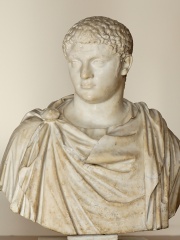
10. Geta (189 - 211)
With an HPI of 86.28, Geta is the 10th most famous Italian Politician. His biography has been translated into 64 different languages.
Publius Septimius Geta ( GHET-ə; 7 March 189 – 26 December 211) was Roman emperor with his father Septimius Severus and older brother Caracalla from 209 to 211. Severus died in February 211 and intended for his sons to rule together, but they proved incapable of sharing power, culminating with the murder of Geta in December of that year.
People
Pantheon has 956 people classified as Italian politicians born between 800 BC and 1994. Of these 956, 120 (12.55%) of them are still alive today. The most famous living Italian politicians include Sonia Gandhi, Sergio Mattarella, and Queen Paola of Belgium. The most famous deceased Italian politicians include Julius Caesar, Augustus, and Commodus. As of April 2024, 17 new Italian politicians have been added to Pantheon including Raffaella Petrini, Raffaele Fitto, and Gaetano Manfredi.
Living Italian Politicians
Go to all RankingsSonia Gandhi
1946 - Present
HPI: 82.49
Sergio Mattarella
1941 - Present
HPI: 79.92
Queen Paola of Belgium
1937 - Present
HPI: 73.09
Giorgia Meloni
1977 - Present
HPI: 72.99
Romano Prodi
1939 - Present
HPI: 71.91
Mario Monti
1943 - Present
HPI: 71.84
Paolo Gentiloni
1954 - Present
HPI: 68.41
Giuliano Amato
1938 - Present
HPI: 68.00
Giuseppe Conte
1964 - Present
HPI: 67.03
Alessandra Mussolini
1962 - Present
HPI: 65.74
Antonio Tajani
1953 - Present
HPI: 65.63
Lamberto Dini
1931 - Present
HPI: 65.41
Deceased Italian Politicians
Go to all RankingsJulius Caesar
100 BC - 44 BC
HPI: 93.78
Augustus
63 BC - 14
HPI: 92.03
Commodus
161 - 192
HPI: 89.79
Benito Mussolini
1883 - 1945
HPI: 88.36
Cicero
106 BC - 43 BC
HPI: 88.19
Pompey
106 BC - 48 BC
HPI: 87.68
Marcus Aurelius
121 - 180
HPI: 87.41
Nero
37 - 68
HPI: 87.19
Francis II, Holy Roman Emperor
1768 - 1835
HPI: 87.05
Geta
189 - 211
HPI: 86.28
Caligula
12 - 41
HPI: 86.28
Brutus the Younger
85 BC - 42 BC
HPI: 85.32
Newly Added Italian Politicians (2025)
Go to all RankingsRaffaella Petrini
1969 - Present
HPI: 57.37
Raffaele Fitto
1969 - Present
HPI: 49.72
Gaetano Manfredi
1964 - Present
HPI: 49.54
Giancarlo Giorgetti
1966 - Present
HPI: 47.82
Giuseppe Valditara
1961 - Present
HPI: 47.50
Alessandro Rossi
1967 - Present
HPI: 47.48
Carlo Calenda
1973 - Present
HPI: 46.34
Anna Maria Corazza Bildt
1963 - Present
HPI: 46.22
Jole Santelli
1968 - 2020
HPI: 44.55
Mario Mauro
1961 - Present
HPI: 44.49
Sara Anzanello
1980 - 2018
HPI: 38.76
Erika Stefani
1971 - Present
HPI: 38.55
Overlapping Lives
Which Politicians were alive at the same time? This visualization shows the lifespans of the 25 most globally memorable Politicians since 1700.

